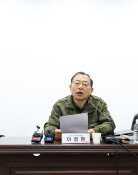Korea's inheritance tax needs to be reformed
Korea's inheritance tax needs to be reformed
Posted August. 12, 2019 07:31,
Updated August. 12, 2019 07:31
Business owners lament that there should be more to public discussion on the significance of growing material and parts industries. It is meaningful to discuss how to boost the growth of weak industries. However, they see that it is likely one generation later that they will falter or be handed over to foreign capital in the M&A market. Business leaders attribute such a risk to the higher burden of inheritance tax in Korea.
An owner of a world-class electronic material and parts business once said that he would reduce his shares to zero in order to lessen his children’s burden of inheriting them. Turning the owner’s shares over to his children requires the owner to pay taxes by cash or in the form of real estate. If the owner sells his shares instead, he may be labeled by other shareholders as being irresponsible. He explained that the reduction of his capital to zero leads to increases in other shareholders’ shares, which will earn him less criticism and more cash savings. “I have considered avoiding too high inheritance taxes this way even as my children are still young,” he said.
Korea is known for its excruciatingly high inheritance tax rate or 50 percent around the world. Added to this, the extra charge to the largest stockholder requires more payments up to 30 percent of shares in possession, which will still remain burdening even after it lowers to 20 percent starting from next year in the event that a revision bill of the taxation law passes the National Assembly. With farming and fishing villages special tax in consideration, inheriting 100 million won’s worth of shares involves 70 million won in tax payment.
Considering the material and parts industries create high added value, many businesses may record more than one trillion own in sales. SME owners may see that they find it hard to make changes to their business plan for news projects, personnel structure and capital restructuring in an effort to catch up with the 4th industrial revolution as they are not allowed to change business type, payrolls and capital.
Tax arising from succession of a family business should not be regarded as a tax on unearned income any longer. There must be reason why advanced countries such as the United States, Britain and Germany charge lower inheritance taxes and impose more flexible regulation on sales figures, payroll scales and conditions attached to business maintenance. The payment of inheritance tax is postponed in the event that a family business remains intact in other countries. They believe that it is better to allow owner families to remain engaged in business rather than charging them punitive taxation if their business contributes to creating added value in the national economy and boosting the job market.
In the current bad economic conditions, many owners of SMEs take a step backward from business ownership worrying about succession. Reportedly, a financial firm that transacts mainly with such companies signed an execution with an M&A broker company. The broker may not necessarily bring a Korean purchaser in the event of an M&A deal.
“The government aims at growing world-class businesses in the material and parts industries. It never happens overnight,” lamented an owner of a mid-sized company. “The precondition is that an enabling environment is created if Korea wants to produce companies 100 to 200 years old just as German ones.”
artemes@donga.com







